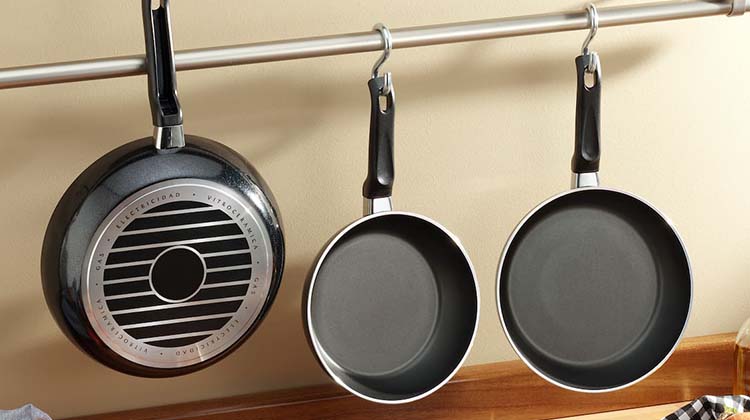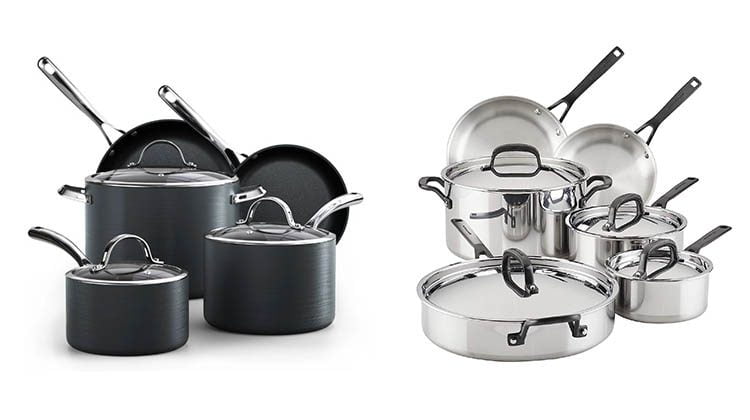Is Hard Anodized Cookware Safe? Here's What You Need to Know!

Are you looking for cookware that is not only durable but also safe to use? If so, then hard anodized cookware might be just what you need! This type of cookware has gained popularity in recent years due to its many benefits. So you have to know Is Hard Anodized Cookware Safe?
By the way, Hard anodized cookware is generally considered safe for everyday use. It creates a hard, nonporous surface on aluminum pots and pans. This process makes the cookware resistant to scratches, corrosion, and wear.
Furthermore, the anodizing process seals any potential aluminum leaching into food, making it safer than regular aluminum cookware.
So, I’m going to teach you the ins and outs of hard anodized cookware and answer the burning question: Is hard anodized cookware safe?
What is hard anodized cookware?
Anodized cookware is different from your average set of pots and pans. It goes through a specialized manufacturing process that makes it stand out from the crowd.
The term “hard anodized” refers to the electrochemical treatment that aluminum undergoes, resulting in a durable and non-reactive surface.
The aluminum is submerged in an acid bath and exposed to an electrical current during this process. It causes oxygen from the air to bond with the metal, creating a thick oxide layer on the surface.
Moreover, this layer gives hard anodized cookware unique properties – exceptional heat distribution, durability, and resistance to scratches and corrosion.
So, this non-reactive cookware doesn’t stick to food. It uniformly distributes heat, cooking food equally. Hard anodized cookware can last for years with proper care and maintenance.
Related Content:
What Is Hard Anodized Cookware?[Learn to Get Clear Concept]
How is hard anodized cookware made?

Do you know how hard anodized cookware is made? Let’s dive into the process!
First, a base material—usually aluminum—is treated to remove any impurities. It prepares for anodization. The cookware is immersed in sulfuric acid and electrically charged. Acid oxygen ions interact with cookware aluminum atoms.
This electrochemical reaction creates a hard, permanent aluminum oxide coating on the surface, giving hard anodized cookware its particular qualities. The thickness of this oxide layer can vary but generally ranges between 25-100 microns.
Finally, the product is lightweight, robust, and heat-distributive cookware. Its non-reactive surface lets you prepare various foods without worrying about undesirable flavors or chemical reactions.
So, If you look for the best cookware set, you’ll be pleased to know that hard-anodized cookware is durable and versatile and safe for your cooking needs.
Tips for Safe Use of Hard Anodized Cookware
Tips for Safe Use of Hard Anodized CookwareIf you’re an avid cook or enjoy spending time in the kitchen, you’ve probably heard of hard anodized cookware.
It’s known for its durability, even heating, and nonstick properties. But is hard anodized cookware safe to use? In this blog post, I’ll explore the safety aspects of hard anodized cookware and provide tips for its safe use.
Many people wonder if the aluminum used in hard anodized cookware poses any health risks. But the good news is that the anodization process creates a barrier preventing aluminum from leaching into your food. It makes Your food safe for everyday use.
To ensure the safe use of hard anodized cookware, here are some tips to keep in mind:
Choose high-quality cookware:
When purchasing hard anodized cookware, choose reputable brands that adhere to strict manufacturing standards.
It will ensure that the cookware is made using safe materials and processes.
Avoid using metal utensils:
While hard anodized cookware is known for its longevity, it’s still important to use non-metal utensils to prevent scratching the surface.
Metal utensils can damage the nonstick coating, potentially exposing the underlying aluminum.
Use gentle cleaning methods:
Avoid using abrasive cleaners or scrubbers on hard anodized cookware. Instead, opt for soft sponges or dishcloths to clean the surface.
Harsh cleaning methods can also damage the nonstick coating, compromising its safety.
Avoid high heat:
Hard anodized cookware is known for its excellent heat conductivity, which means you can achieve great cooking results at lower temperatures.
So, you should avoid using high heat settings as excessive heat can damage the nonstick coating and reduce the lifespan of your cookware.
Don’t store food in the cookware:
After cooking, transfer your food to storage containers instead of leaving it in hard anodized cookware.
Because storing food in the cookware can lead to the development of harmful bacteria and cause the nonstick coating to deteriorate over time.
Regularly inspect your cookware:
Over time, the nonstick coating on hard anodized cookware may start to wear off. Inspect your cookware regularly for any signs of peeling or flaking. If you notice any damage, replacing the cookware is best to ensure your safety.
At last, while the nonstick coating on most hard-anodized pans is PFOA-free (a potentially harmful chemical), checking the manufacturer’s information before purchasing is always recommended.
Your hard anodized cookware will last longer if you follow these tips. Happy cooking!
Hard anodized cookware vs. stainless steel

Hard-Anodized: Hard-anodized cookware is made from aluminum that has undergone an electrochemical process called anodization.
This process creates a hard, nonstick surface on the aluminum, making it resistant to scratches and corrosion.
Stainless Steel: In stainless steel cookware, iron, nickel, and chromium are the main metals. It is known for its longevity and resistance to rust and corrosion.
The differences between Hard anodized cookware vs. stainless steel are well illustrated by the table below
Features | stainless steel cookware | Hard-Anodized Cookware |
Material Composition | Iron, chromium, nickel | Aluminum |
Heat Distribution | Uneven heat distribution | Even heat distribution |
Non-Stick Properties | Not inherently non-stick | Non-stick surface |
Durability | Highly durable | The durable, anodized coating may wear off over time |
Maintenance | Relatively easy to clean | Easy to clean, avoid abrasive cleaners and utensils |
Reactivity | Non-reactive | Non-reactive |
Price | Various price points | Slightly more expensive |
The best type of cookware for you will depend on your individual needs and preferences. If you are looking for durable and long-lasting cookware resistant to rust and corrosion. Then stainless steel is a good option.
If you are looking for cookware that heats up quickly and evenly and has a nonstick coating, then hard-anodized aluminum is a good option. For the time being, when it comes to cookware for gas stoves, hard-anodized cookware stands out as a safe and reliable option that ensures efficient heat distribution and durability.
Related Content:
Best Cookware Sets Under $200 – Tested & Reviewed
Hard anodized cookware health risks
Exploring the Health RisksIn recent years, hard anodized cookware has gained popularity due to its nonstick properties, even heat distribution, and so on.
However, concerns about its safety have also emerged. The question on many people’s minds is: “Does hard anodized cookware cause cancer?” In this topic, I’ll delve into the topic of hard anodized cookware health risks and explore whether it is a safe choice for your kitchen.
We all know that An electrochemical method makes hard, non-reactive aluminum cookware. Moreover, an acid bath and electric current are used to treat aluminum.
Besides, aluminum leaching into food is a hazard with hard anodized cookware. Aluminum, a prevalent metal in food, is harmless in small doses. Some research has connected high aluminum levels to Alzheimer’s disease.
Cooking acidic foods like tomatoes or citrus in hard anodized cookware increases metal leaching.
Acidic foods can react with aluminum, especially if the nonstick coating is damaged. If you cook acidic meals often, try other cookware.
Tips for hard anodized cookware safety:
- Check the nonstick coating for damage. Replace cookware with scratches or peeling.
- Avoid scratching the surface with metal or abrasive implements. Use wooden or silicone utensils.
- Excessive heat breaks down the nonstick coating and increases aluminum leaching. Cook on medium or low heat.
- Use stainless steel or cast iron to reduce aluminum leaching when cooking acidic meals.
- This cookware may provide health hazards, although the research is inconclusive. Hard anodized cookware that is not damaged or worn is FDA-approved.
Finally, hard anodized cookware’s cancer risk is unclear. However, aluminum leaching issues must be considered and safeguards are taken.
Furthermore, talking to a doctor or researching other solutions may help if you’re worried about your cookware’s safety.
Pros and cons of hard anodized cookware
Is It Safe for Your Kitchen? When selecting cookware for your kitchen, there are many options available on the market.
One such popular choice is hard anodized cookware. Known for its durability and nonstick properties, hard anodized cookware has gained immense popularity among home cooks and professional chefs alike.
It’s important to understand these cookware’s pros and cons, particularly regarding safety, before investing. However, like any product, it also has its pros and cons.
Hard anodized cookware advantages
- Durability
- Nonstick Surface
- Even Heat Distribution
- Versatility
- Easy to Clean
- Healthier Cooking
- Scratch-Resistant
- Lightweight
- Longevity
- Safe Cooking
Related Content:
10 Best Cookware Set Under $100 with Buying Guides, Pros & Cons
Hard anodized cookware disadvantages
Reactive to Acidic Foods: Hard anodized cookware can react with acidic foods, potentially causing a metallic taste in the food. It is recommended to avoid cooking highly acidic dishes with this type of cookware.
Not Dishwasher Safe: Most hard anodized cookware is not suitable for dishwashers. The harsh detergents and high heat in dishwashers can damage the nonstick coating and reduce the cookware’s lifespan.
Price: Hard anodized cookware tends to be more expensive compared to other types of cookware, making it a less budget-friendly option for some individuals.
While hard anodized cookware offers many advantages, it’s important to consider these disadvantages to decide whether it suits your specific cooking needs and preferences.
Final Thought
In summary, hard anodized cookware is non-toxic, promotes even heat distribution, resists scratches, and exhibits non-reactive properties.
Is hard anodized cookware safe? Its strong build and special manufacturing process make it a great choice for cooking. It’s durable and won’t easily get scratched.
Plus, it spreads heat evenly and has a nonstick surface, which makes cooking a breeze. So, using hard-anodized cookware, you can cook your favorite meals without worry.
So, go ahead and confidently whip up the manufacturer’s instructions. You should take the necessary precautions; you can enjoy the benefits of hard anodized cookware in your kitchen for years to come!